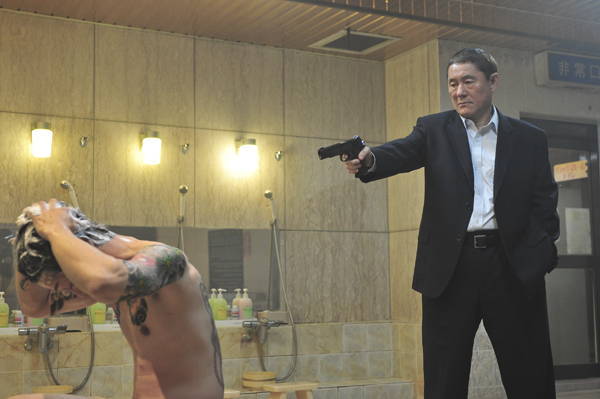
Beat Takeshi (with gun) in OUTRAGE (Magnet Releasing)
Written & Directed by Takeshi Kitano
Produced by Masayuki Mori & Takio Yoshida
Released by Magnet Releasing
Japanese with English subtitles
Japan. 109 min. Rated R
With Beat Takeshi, Kippei Shiina, Ryo Kase, Tomokazu Miura, Jun Kunimura, Renji Ishibashi & Tetta Sugimoto
![]() The bleakly funny Japanese gangster drama Outrage came out in its home country over a year ago. In fact, a sequel is already in the works. But for U.S. audiences, it’s a case of better late than never. This welcome return to form for director-star-writer Takeshi Kitano is, for us, one of the best films of the year.
The bleakly funny Japanese gangster drama Outrage came out in its home country over a year ago. In fact, a sequel is already in the works. But for U.S. audiences, it’s a case of better late than never. This welcome return to form for director-star-writer Takeshi Kitano is, for us, one of the best films of the year.
The episodic tale of backstabbing yakuza kicks off when Ikemoto (Jun Kunimura), a devious, high-ranking mobster, is tasked by his even more devious boss, a hilarious Kim Jung-Il lookalike, to stop fraternizing with a rival thug. The problem is that Ikemoto has sworn a pact of brotherhood with the rival while both were in prison. Or rather this would be a problem if Ikemoto, or anyone else in the Tokyo underworld, wasn’t a double-dealing dog. Ikemoto can’t directly dirty his fingers, so he orders his minions, led by Otomo (Kitano), to harass his blood brother, hoping to take over his turf. Meanwhile, his underlings have hopes of their own to move in on the local drug trade. Provocations escalate on all sides and spin out of control.
This is not a sociological depiction of Japanese gangsterdom, The Wire of the yakuza. Everything is turned up to a higher pitch and played at a queasy middle point between disgust and laughs. The thugs all have an inflated sense of honor, although without honor themselves, beating one another half to death at the slightest perceived insult. They are almost always shown moving in packs, shouting and humiliating each other to enforce a rigid hierarchy that seems to belong more to the lower animals.
Although long known as a funny man and TV host in Japan, Kitano (also known as Beat Takeshi) built his reputation in the U.S. mostly with Sonatine and Hana-bi, measured, meditative gangster films punctuated by bursts of extreme violence. (We are all agreeing to forget his English-language yakuza film Brother, OK?) Outrage can be rather shocking in its brutality—chopsticks get shoved in various orifices, impromptu dental work is done, but in it Kitano has found a more engaging, natural rhythm. Hana-Bi, which featured extended shots of Kitano’s own paintings, feels prettified in comparison. This film is looser, without a main character, although it has its own internal, elegant structure as it surveys its world with a satirist’s angry contempt.
It’s also really funny. Kitano, with a face that looks like a plug of wax held too close to a flame, drops the near-wordless persona he’s adopted for earlier movies. Freed from this stylized device, the dark comedy has more room to breathe. For instance, Otomo holds his own in a blackly amusing bit where he tries to get a crook from a rival faction to cut off a finger in an act of penance; the crook complains the offered knives are too dull.
Regrettably, there are some (terrible) scenes shot in English. These mainly involve a gambling racket run out of the embassy of a fictitious African country (called “Ghanin” or some such thing). The English is spoken by, and to, the hapless African ambassador, who’s more or less unwillingly roped into a scheme. These bits also play with some awkward racial comedy that hasn’t survived the import process. At one point, after the gangsters abandon the ambassador by the side of the road at night, they tell him not to worry about his safety walking home: “You’ll blend in.”
Let’s hope he doesn’t come back for the sequel.
















Leave A Comment